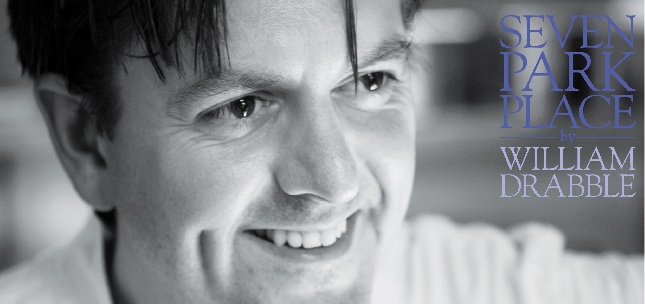by Jozef Arabi
In the heart of London lies the red and white Victorian façade of the St James’s Hotel & Club. Recognised for its quality, glamour and style the hotel’s Seven Park Place restaurant has recently joined a higher league of culinary recognition by having been awarded a Michelin Star in the 2011 guide. However the man behind this culinary achievement is no stranger to the Michelin inspectors.
Head Chef William Drabble (WD) has spent the better part of his life working in some of London’s top restaurants and achieving numerous Michelin stars along the way. By the Age of 26 WD had already taken on the challenge of becoming a head chef and his efforts were rewarded with his first Michelin star just 6 months later. A year on and WD was back in London and now filling the role left by Gordon Ramsey at the Aubergine restaurant, once again he rose to the challenge and ensured that the restaurant gained a Michelin star in 1999. He remained at the Aubergine for 10 years maintaining the highest of standards and winning awards.
Now the recently revamped and restored St James’s Hotel & Club is home to his two latest culinary endeavours; the Michelin starred fine dining restaurant ‘Seven Park Place’ and the more casual ‘William’s Bar and Bistro’. The style of cuisine is described as modern French primarily using British Local seasonal ingredients; which is very much in line with WD’s genuine passion for seasonal cooking and using the finest British produce. The decor throughout the Hotel is glamorous and chic, this carries through to both restaurants where elegance and luxury are exuded.
Talking to WD I could see that he has been through his paces in the kitchen and has accumulated a wealth of experience in his profession. He has faced the pressure, gone through the ups and downs and worked harder than many people ever will, in short he has led a life that all successful chefs of his calibre have to face in their journey to the top.
Why did you become a chef?
Well like all young boys from Liverpool my first ambition in life was to become a premier league football player, but one of the influences which led to me becoming a chef was when my whole family moved from Liverpool, to Norfolk. The two places were very different; all of a sudden we were surrounded by farm land for miles, the closest neighbour was a long walk away and shops an even further distance. Living in those surroundings really gave me an appreciation for where the food we eat comes from, how it’s grown and the seasonality. It wasn’t a lifestyle choice to eat seasonally; it was just the natural choice when you live in a rural area. I also have to say my grandmother played a large role in my appreciation for cooking, during the 1920s up to the 1940s she worked in Yorkshire’s great estates as a cook, the way she would describe it all to us was just so intriguing to me.
How I actually ended up working as a chef was as a result of my father speaking to a gentleman called Martin Jermey, who was a lecturer at the college I ended up going to. As I was only 14 at the time Martin had recommended I get some work experience before joining catering school, so I began working in a kitchen unpaid for the next two years to gain the experience I needed to get into catering school.
What was your first big break?
One of the first great opportunities I had was after graduating school, I moved to a restaurant that had just opened up in Eastborne (south of England) as a kitchen apprentice. The pace was slow and we were never that busy, however as a result the chefs there genuinely took the time and effort to show me all the food preparation and cooking techniques that would equip me for the future. It was a great practical learning experience that I don’t believe enough young chefs get these days especially in London where the pace is so fast.
Who has been your biggest influence?
Over the years you are influenced by so many people and events that it is difficult to narrow it down to one person or situation. I would definitely say that Martin Jermey (my college lecturer) was a big influence in that he got me my first job after school and has been a great guide and sounding board throughout my career, I am still in touch with him till today.
Then there was my first experience of working in London at the Capital Hotel in Knightsbridge with Philip Brittle , followed by a period working at the 3 Michelin starred ‘Chez Nico’ and then working as a Sous Chef with Tom Akins at ‘Pied a Terre’ (2 Michelin star restaurant). Each of these experiences taught me something that I have carried with me; at the Capital it was the inspiration of going to the market every couple of days to buy fresh seasonal produce on which the menu would be based around, at Chez Nico it was seeing how a 3 star restaurant could cater for up to 100 guests at dinner (this is no small achievement for a restaurant of that level), and finally I took inspiration for Tom Akins, who himself has become a very successful chef and deservedly so as he is a great cook.
What is your greatest achievement to date?
After leaving Pied a Terre I moved to Grasmere (north of England) as the Head Chef at a country house hotel called ‘Michael’s Nook’. I took up the position in August of that year and by the following January we had been awarded a Michelin Star. The following September I had moved back to London and was the Head Chef of the fashionable Chelsea restaurant ‘Aubergine’, once again by the following January we were awarded a Michelin star.
What was it like first becoming a head chef and then receiving a Michelin star so soon after?
When you become head chef, the buck stops with you, it’s you on the plate, you’re father to everyone in the kitchen and the responsibility is tremendous. At the time of gaining the first star at Michael’s Nook I was only 26, the pressure can cause you to make mistakes, act out of character and you’re general lack of experience at that age means you can’t always foresee problems. Once you gain that first star it puts you on the radar, all of a sudden you start being more analytical and critical of every dish on your menu and every element in each dish. But as time goes on you develop your own style and the experience which allows you some reprieve from all the pressure. It’s at this point that you begin to refine your style and take on greater challenges in the kitchen.
What is your signature dish?
I don’t particularly have one dish that I would describe as my signature dish, the seasons are always changing and as I have mentioned already; cooking in line with the season is very important to me. However there are particular dishes that when in season I enjoy cooking and guests will always request such as; the ravioli of Langoustine with cabbage and truffle butter sauce, the Marinated scallops with crab and blood orange as well as the Braised stuffed oxtail with celeriac mash, wild mushrooms and bone marrow.
What are your predictions for the future of restaurants and dining?
As people are becoming more aware of what is being put on their plate and where it comes from, seasonality, sustainability and environmental issues are becoming more important criteria for chefs when designing their menus. At St James’s Hotel we source as much of our ingredients as possible from small British suppliers like Cornvale where we get our game and Lune Valley lamb, Keltic Sea Fare for scallops, langoustines and Scottish girolles, Channel Fisheries for fish and Southwest Fisheries for shellfish. Having grown up surrounded by farms I really believe it is important to support British farmers and food suppliers.
What are the biggest misconceptions out there about restaurants?
I don’t think people generally have a full appreciation for the whole process that goes into the dishes that are served in front of them. In a nutshell; each dish starts on a farm or in the sea, it then takes those farmers and fishermen, to get up in the dark early (mostly rainy) mornings to harvest that produce, which is then prepared for delivery, packaged, taken on a journey and delivered to the restaurant where the ingredients are then painstakingly prepared, cooked and presented by a trained team of professionals both in the kitchen and the restaurant. That is how a dish gets to you. There is a lot of time, care, resources and effort involved.
If you could cook for anyone, who would it be?
My Grandmother, as I never got the chance to, she has always been a fundamental reason for why I became a chef and I would have liked to have shared that with her.








